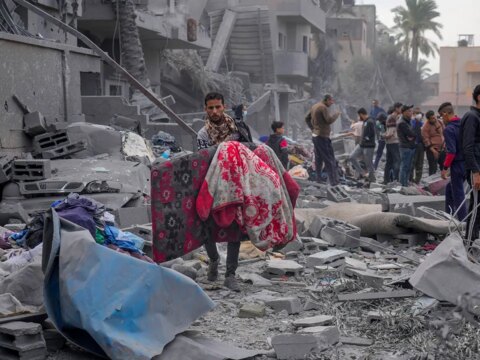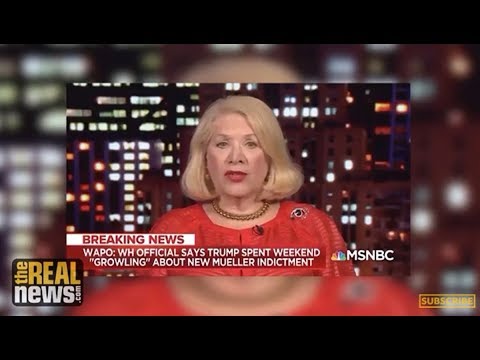MEXICO CITY (AP) — President Andrés Manuel López Obrador took office in 2018 hoping to recover Mexico’s old reputation as the diplomatic leader of Latin America, but what he’s managed to do is get several of his country’s ambassadors kicked out of countries in the region.
On Friday, López Obrador doubled down after Ecuador ordered the Mexican ambassador out of the country a day earlier, vowing to send a military plane to remove the ambassador and pledging to continue the heated rhetoric. Previously, both Peru and Bolivia had withdrawn their ambassadors in similar disputes.
MEXICAN PRESIDENT DENIES CARTELS ARE PRODUCING MOST FENTANYL, BLAMES US DRUG USE ON FAMILY BREAKDOWN
López Obrador acknowledged that more countries may expel Mexican diplomats because of his criticism of conservative governments, saying that was “because our posture is uncomfortable for the oligarchies of Latin America, and those that really run things, the foreign hegemonic forces.”
That sounds like staunch leftist rhetoric from the 1960s to the early 80s, the period López Obrador is nostalgic for, when Mexico’s old ruling party, the PRI, defended Cuba and helped start peace talks with leftist rebels in Central America. But the president hasn’t adapted to Latin America’s recent rapid swings from left to right.
“For a guy who’s really not interested in foreign policy, he’s got these pipe dreams of what Mexican foreign policy should look like,” said Arturo Sarukhan, Mexico’s former ambassador to the U.S. “It’s nostalgia, it’s the Mexico that he cut his teeth in as a politician, the PRI, it’s the typical PRI foreign policy of using Latin American as a foil vis-a-vis the U.S.”
While it sounds like just another of the president’s recurring, petty diplomatic disputes — López Obrador is famously uninterested in foreign policy and seldom travels or meets with other leaders — this one could escalate.
Mexico is using its embassy in Ecuador to protect an official from the former leftist government of ex-president Rafael Correa, who López Obrador really liked. The ex-official is fleeing two convictions and more investigations for corruption. Mexico upped the ante Friday by granting him asylum, and voiced fears Ecuador could raid the embassy to arrest the former official, who is accused of corruption.
“The Mexican government rejects the increased presence of Ecuadorian police forces outside the Mexican Embassy in Quito,” the Foreign Relations Department said in a statement Friday. “This clearly constitutes harassment of the embassy and is a flagrant violation of the Geneva Convention.”
The whole spat started after López Obrador — who is known for making off-handed comments during his marathon-like daily news briefings — made insulting comments about current Ecuadorian President Daniel Noboa, suggesting the conservative won office because “they created this climate of fear.”
López Obrador claimed the conservatives used the 2023 assassination of Ecuadorian presidential candidate and anti-corruption crusader Fernando Villavicencio, to swing the elections in Noboa’s favor and block the return of Correa’s leftist movement.
Coming from a Mexican leader, the comments were particularly sensitive given that Mexican drug cartels are believed to be involved with many of the Ecuadorian gangs responsible for the exploding levels of violence in the South American country. López Obrador has a policy of not confronting the cartels.
But the comments also appeared to be insulting on a personal level to many.
Amanda Villavicencio, one of the daughters of the assassinated candidate, wrote in her social media accounts Thursday that “López Obrador, you should wash your mouth out before talking about my father. Fernando Villavicencio was killed by the mafiosos he always investigated, some of whom have taken refuge at your embassy and in your country.
The situation is complicated by the fact that things haven’t really been going López Obrador’s way in Latin America.
The former leftist president of Argentina, Alberto Fernandez, is one of López Obrador’s only close allies in the region, along with Cuban President Miguel Diaz-Canel, the only foreigner ever invited to speak at a Mexican Independence Day celebration. Fernandez was swept out of power in last year’s elections by radical libertarian and free-market proponent Javier Milei.
The other major diplomatic leader in Latin America, Brazil’s leftist President Luiz Inácio Lula da Silva, has been well ahead of López Obrador on adopting a neutral stance on Russia’s invasion of Ukraine and condemning Israel for the war in Gaza. At one point he controversially compared Israel’s actions to the Holocaust.
So López Obrador’s hopes of leading a resurgent leftist tide in Latin America — waves that periodically swept the region every decade or so — have been frustrated by a region that now much more resembles a pinball machine of rapid switches, rather than a grand swing of any ideological pendulum.
“He doesn’t understand foreign policy,” Sarukhan, the former diplomat, said. “He doesn’t understand how the world has changed since the 1970s and how Mexico’s role in the world has changed.”
But in a real sense, Latin America is second to maintaining Mexico’s most economically important relationship, with the United States. Latin America is a stage where Mexico can ‘look’ leftist, while kowtowing to U.S. demands on everything else.
In 2022, López Obrador famously refused to attend a U.S. summit in Los Angeles because Cuba, Nicaragua and Venezuela hadn’t been invited.
But apart from some economic support for Cuba, including buying vaccines and importing doctors and supplying the island with oil, López Obrador’s support for Cuba has remained largely rhetorical.
López Obrador pledged at the beginning of his administration that there would be no tension with the U.S. and he has largely kept that promise by reliably acceding to every U.S. request on the most important issue, migration.
Mexico has agreed to try to stop migrants before they reach the U.S. border and agreed to accept deportees who are not Mexican citizens, something that by law it doesn’t have to do.
Mexican president wanted to lead Latin America, but reality and his own rhetoric got in the way ,




















